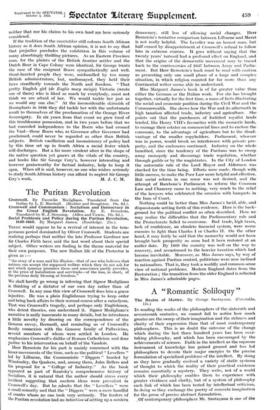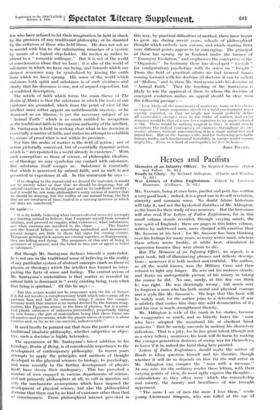A "Romantic Soliloquy" IN reading the works of the philosophers
of the sixteenth and seventeenth centuries, we cannot fail to notice how much greater are the sweep of their imagination and the richness and clarity of their expression than that of most contemporary philosophers. This is no doubt the outcome of the change which during the last three hundred years has been over- taking philosophy, and which has been encouraged by the achievements of science. Faith in the intellect as the supreme instrument of knowledge has gained ground and has led philosophers to devote their major energies to the precise formulation of specialized problems of the intellect. By doing so they have gradually evolved a variety of static systems of thought to which the reality of their practical existence remains essentially a mystery. They write, not of a world which their philosophy enables them to experience with greater vividness and clarity, but of a system of philosophy each link of which has been tested by intellectual criticism. In doing so they exchange the poetry of concrete imagination for the prose, of precise abstract formulation. ,Oreonternporarrphilosophces Mr. Santayana is one of-the
few who have refused to let their imagination be held in check by the premises of any traditional philosophy, or be daunted by the criticism of those who hold them. He does not ask us to ascend with him to the culminating branches of a system by means of a logical step-ladder. He invites us rather to attend to a "romantic soliloquy." But it is not of the world of consciousness alone that we hear ; it is also of the world of substance in which we have our being, and towards which our deepest reverence may be symbolized by kissing the earth front which we have sprung. His sense of the world which embraces both spirit and substance is of such vividness and clarity that his discourse is one, not of argued exposition, but of confident description.
The article of faith which forms the main theme of The Realm of Matter is that the substance in which the roots of our existence are grounded, which from the point of view of the intellect must either appear an unfathomable mystery, or be dismissed as an illusion, is yet the necessary subject of an
Animal Faith" which is as much entitled to recognition as the traditional faith in the supreme authority of the intellect. Mr. Santayana is bold in making clear what in his doctrine is essentially a matter of faith, and makes no attempt to establish by means of proof what is not within its province.
Fur him the realm of matter is the field of action ; not of action pictorially conceived, but of essentially dynamic action which is" interpolated in a world already in existence." With such conceptions as those of science, of philosophic idealiSm, or of theology we may symbolize our contact with substance. But substance itself escapes us. Substance is essentially that which is perceived by animal faith, and as such is not presented in experience at all. In this connexion he says :—
" If in clinging to the immaterial we denied the material, it would net be merely ashes or dust that we should be despising, but all natural existence in its abysmal past and in its indefinite fertility ; and it would be, not some philosopher's sorry notion of matter that we should be denying, but the reality of our animal being, the fact that we are creatures of time, rooted in a moving universe in which our days are numbered."
Or again :— " It is by boldly believing what transcendental necessity prompts any hunting animal to believe, that I separate myself from arrested idealism, and proceed to enquire what existences, what substances. and what motions are involved in the chase. . . . The hunter and the hunted believe in something ambushed and imminent : present images are little to them but signs for coming events. Things are getting thick, agents are coming together, or disappearing they are killing and dying. The assurance of this sort of being is assurance of existence, and the belief in this sort of agent is belief in substance."
But though Mr. Santayana declares himself a materialist, he is not one in the traditional sense of believing in the reality
of any particular system of abstract concepts (such as those of physics or .theology) which the intellect has formed in inter- preting the facts of sense and feeling. The central axiom of Mr. Santayana's materialism is that matter as revealed by animal faith is dominant in" every existing being, even when that being is spiritual." Of this he says :— " But this axiom would not be consonant with the life of Nature if it did not involve a complementary truth which takes away all its partisan bias and half its inhuman sting: I mean the comple- mentary truth that matter is no model devised by the human imag- ination, like Egyptian atoms or the laws of physics, but is a prim- eval plastic substance of unknowni potentiality, perpetually taking on new forms ; the gist of materialism being that these forms' are all passive and precarious, while the plastic stress of matter is alone creative and, as far as we can surmise, indestructible."
It need hardly be pointed out that from the point of view of traditional idealistic philosophy, whether subjective or objec- tive, such a doctrine is highly heterodox.
The appearance of Mr. Santayana's latest addition to his tetralogy, I?calin of Being, is of considerable importance to the development of contemporary philosophy. In recent years attempts to apply the principles and methods of thought developed in the physical sciences to biology, to psychology, and more recently to the further development of physics itself, have shown their inadequacy. This has provoked a number of men engaged in various departments of science, snit not primarily philosophers at all, to call in question riot only the mechanistic assuinptions which have inspired the development of physical science, but , also the philosophical doctrine that there can be no kind of existence other than that of conadiousnesi.– Froth.- PhilosOjibical interest provoked in this way, by practical difficulties of method, there have begun to grow up, during recent years, schools of philosophical thought which embody new axioms, and which starting front Very different points appear to be converging. The principal of these has sprung up in England under the banner of "Emergent Evolution," and emphasises the conception of the "Organism." In Germany there has developed " Gestalt" (or configuration) psychology with its stress on " Insight." From the field of practical affairs we find General Smuts coming forward with his doctrine (if doctrine it can be caned) of "Holism," and to these Mr. Santayana adds his doctrine of "Animal Faith." That the teaching of Mr. Santayana is likely to win the approval of those to whom the doctrine of emergent evolution makes an appeal should be clear from the following passage :— " Very likely all the movements of matter are more or less elastic or organic : I mean responsive afresh to a total environment never exactly repeated, so that no single law would perfectly ilefluro all consecutive changes even in the realm of matter, and every response would be that of a now-born organism to an unpreeedented v--rid. There would be nothing magical in this : it would merely aistributo the radical contingency of existence throughout an suc- cessive phases, without concentrating it in a single initial fact and initial law. But on she human scale, and for fashioning perishable human works, such fundamental instability in nature would remain negligible. Even in a land of earthquakes we live in houses."
JOHN PILLEY.





















































 Previous page
Previous page